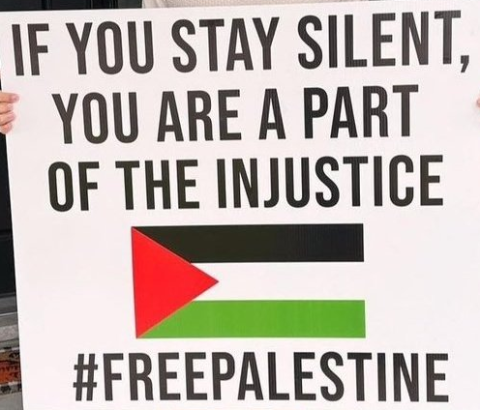
As the sector inspired by the pedagogy of Paulo Freire and committed to his values of social justice, solidarity and transformation, how should development education (DE) respond to the war on Gaza? Drawing upon Freire’s seminal work, Pedagogy of the Oppressed, provides the answer: ‘solidarity requires that one enter into the situation of those with whom one is solidary’. Thus, we should not objectivise the Palestinians or ‘remain distant’ from them by treating them as ‘unfortunates’. ‘Political action on the side of the oppressed must be pedagogical action in the authentic sense of the word, and therefore action with the oppressed’.
So, what are the kind of meaningful actions we can take as development educators to extend our solidarity to Gaza? ‘To surmount the situation of oppression’, argued Freire, ‘people must critically recognize its causes’. Addressing the root causes of injustice, poverty and inequality is central to our practice with learners and critical to understanding the conflict in Gaza. There has rightly been strong condemnation of the deliberate killing, injuring and kidnapping of civilians by Hamas in southern Israel on 7 October with 1,200 fatalities. But as UN Secretary-General, António Guterrres said, ‘the attacks by Hamas did not happen in a vacuum’. Development educators should lend context to the conflict by sharing with learners and partners, the historical origins and daily injustices that are underpinning it. Since 2007, Gaza has been subjected to an Israeli blockade described by Amnesty International as ‘collective punishment’ and a ‘war crime’. The majority of Gaza’s 2.3 million residents are refugees or descendants from the 1948 Nakba (Catastrophe) when 750,000 Palestinians were forcibly displaced from their homeland. Successive generations of Gazans have been living in appalling levels of poverty which have been exacerbated by Israel’s total siege – described by Oxfam as a ‘siege within a siege’ - since the start of the current offensive to include food, water, fuel and medicines.
The current Israeli military offensive in Gaza is the fifth since 2008 with each of them inflicting a high civilian death toll and deliberately targeting civilian infrastructure. Since 7 October, there have been 15,000 fatalities in Gaza including 6,150 children and 4,000 women with 1.8 million or 80 per cent of the population internally displaced and sheltering in UN schools. Among the dead are 198 Palestinian medics, 112 UN staff and 70 journalists and media workers. The World Health Organisation has warned that the dire humanitarian conditions could result in more deaths than those from Israeli bombings given the rapid spread of non-communicable diseases such as diarrhoea and acute respiratory infections. As Gaza faces into winter, 60 per cent of the housing stock has been damaged or destroyed with bakeries, hospitals, schools, health facilities, ambulances, and water and sanitation installations also targeted; in short, the infrastructure needed to support life in Gaza. UN human rights chief, Craig Mokhiber, concluded that Israel’s ‘systematic persecution and purging’ of the Palestinian people represents ‘a textbook case of genocide’ and he resigned in protest.
The Irish government’s response to the asymmetrical war on Gaza was to call for a permanent ceasefire and lifting of the Israeli siege but it could do much more. Ten countries have withdrawn their diplomatic staff from Israel and South Africa has filed a referral to the International Criminal Court (ICC) into alleged war crimes committed by Israel in Gaza. Spanish prime-minister Pedro Sánchez has said Spain would be open to unilaterally recognizing a Palestinian state even ‘if the European Union does not’ and Belgium’s deputy prime-minister, Petra de Sutter, has called for suspension of the association free trade agreement between the EU and Israel. The Irish government could pass into law the Occupied Territories Bill that would ‘ban trade between Ireland and Israel’s illegal settlements in the West Bank’, and the Illegal Israeli Settlements Divestment Bill which would ensure Irish divestment from companies operating in the settlements. These are all valid lobbying points for development educators with a view to pressuring Israel into an immediate ceasefire in Gaza and lifting of the illegal siege. The only solution to the conflict will be found through dialogue just as the recent release of captives and prisoners by Israel and Hamas was agreed through diplomacy not war.
Development educators can also take up the call from Palestinian civil society to support the Boycott Divestment Sanctions (BDS) movement modelled on the anti-apartheid campaign in South Africa and civil rights movement in the US to end the occupation and colonisation of Palestine. Rooted in non-violent direct-action, BDS is supported across the world by trade unions, investment funds, churches, academics and cultural and sporting bodies, to end the oppression of Palestinians. With enough international support, BDS could create the economic pressure and civil society solidarity needed to create meaningful momentum toward a just settlement to the Middle-East conflict for all sides. As a grassroots model of activism for social change, BDS should be a natural ally and partner for development educators.
Development educators should also join the millions of protestors across the world who have marched in solidarity with Palestinians since the start of the conflict. These protestors recognise, as Arundhati Roy puts it, that if we ‘allow this brazen slaughter to continue…we are complicit in it’. ‘Something in our moral selves will be altered forever’. Those in the Irish development education sector who have sat on the side-lines since 7 October should recall Freire’s warning that there no such thing as a neutral education process. He said: ‘Washing one's hands of the conflict between the powerful and the powerless means to side with the powerful, not to be neutral’.
Stephen McCloskey
4 December 2023





